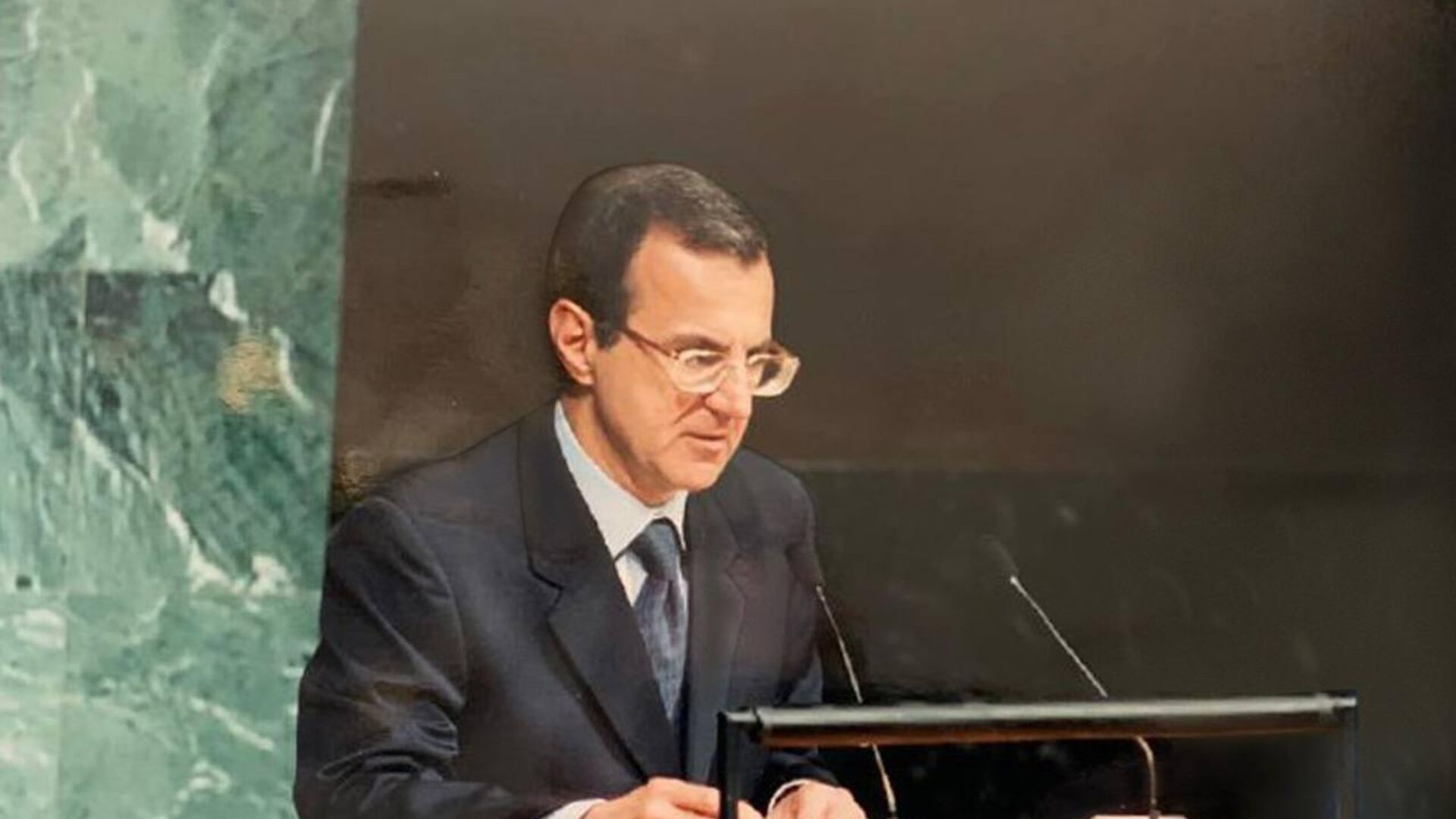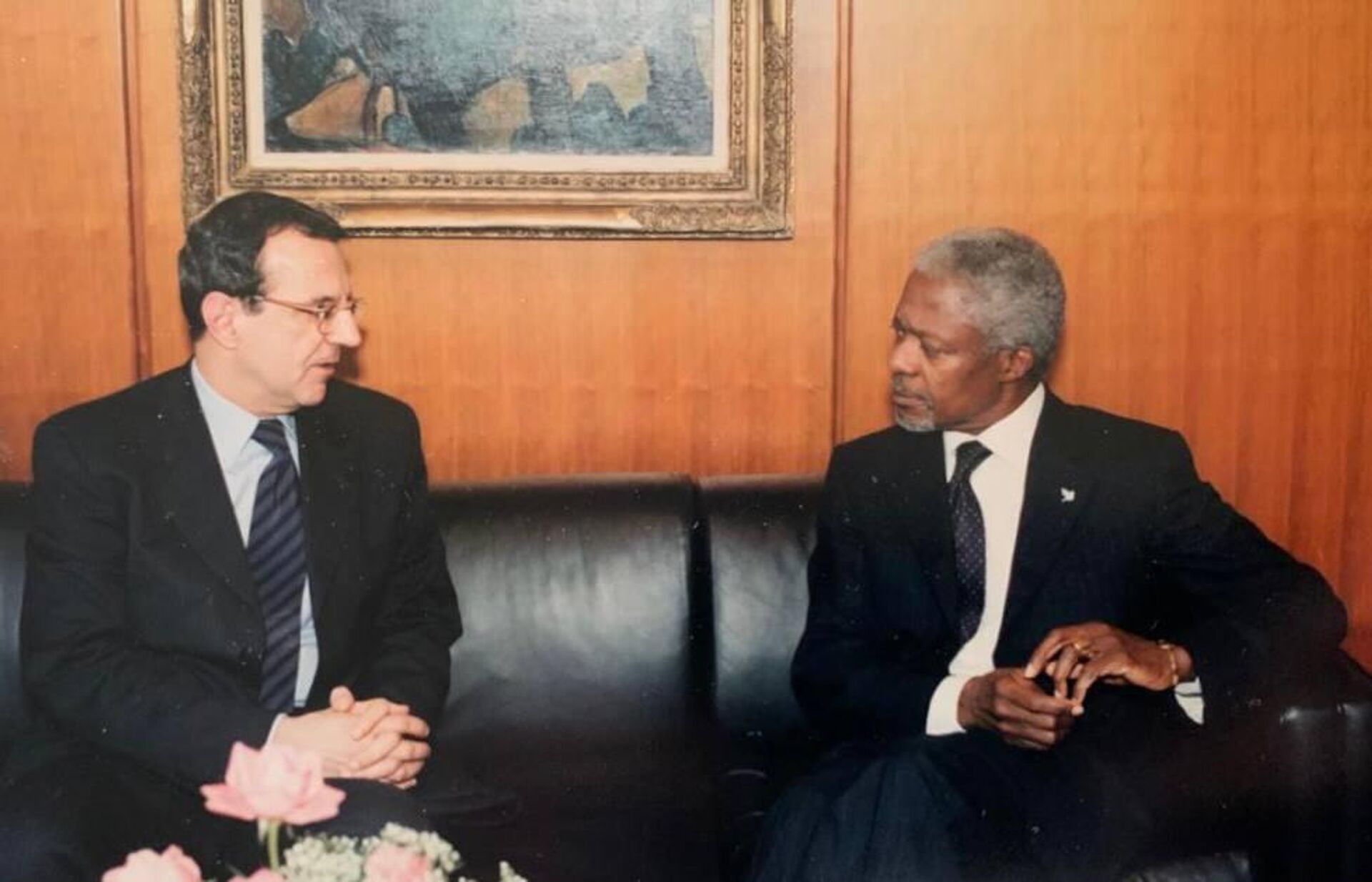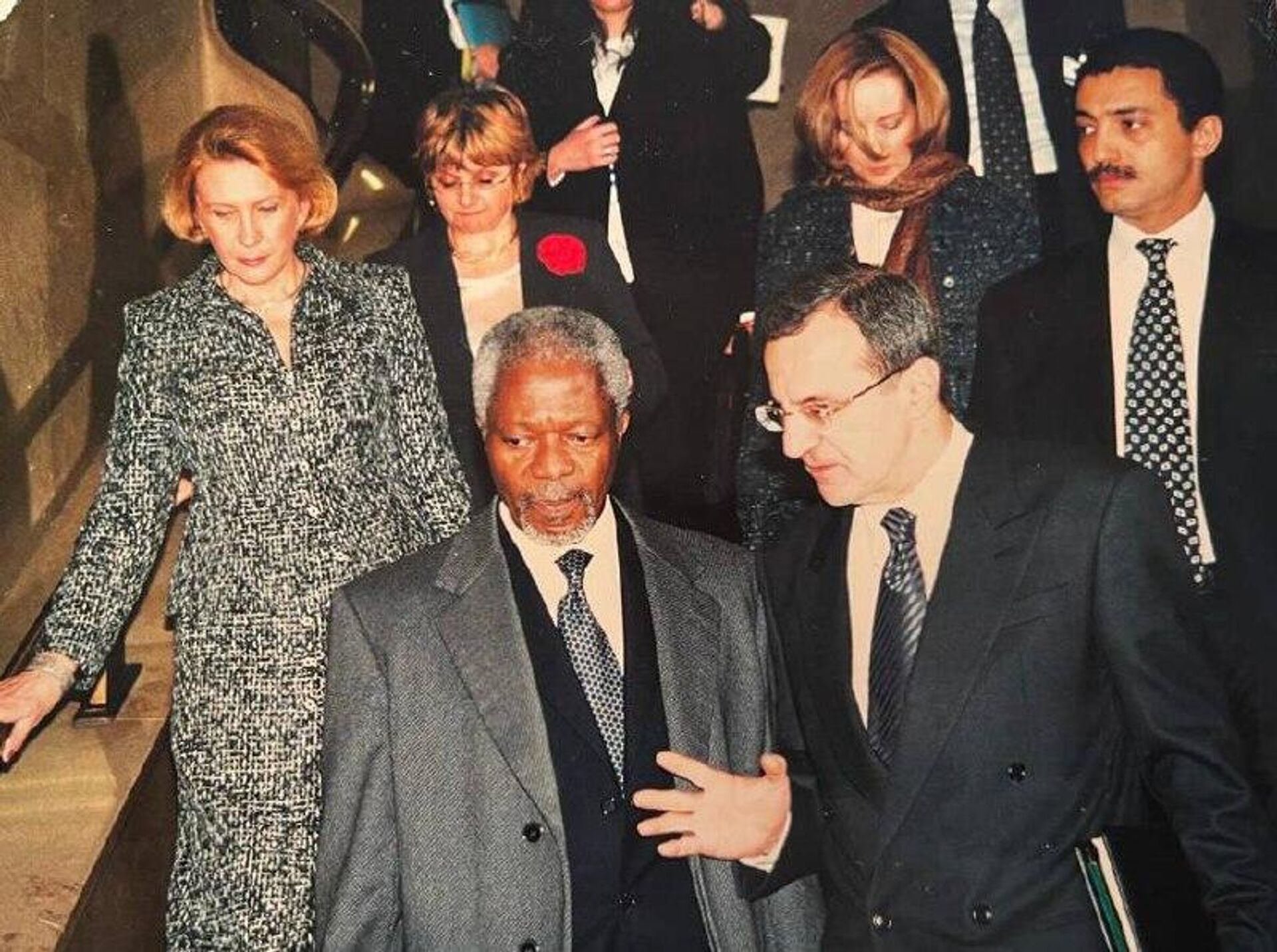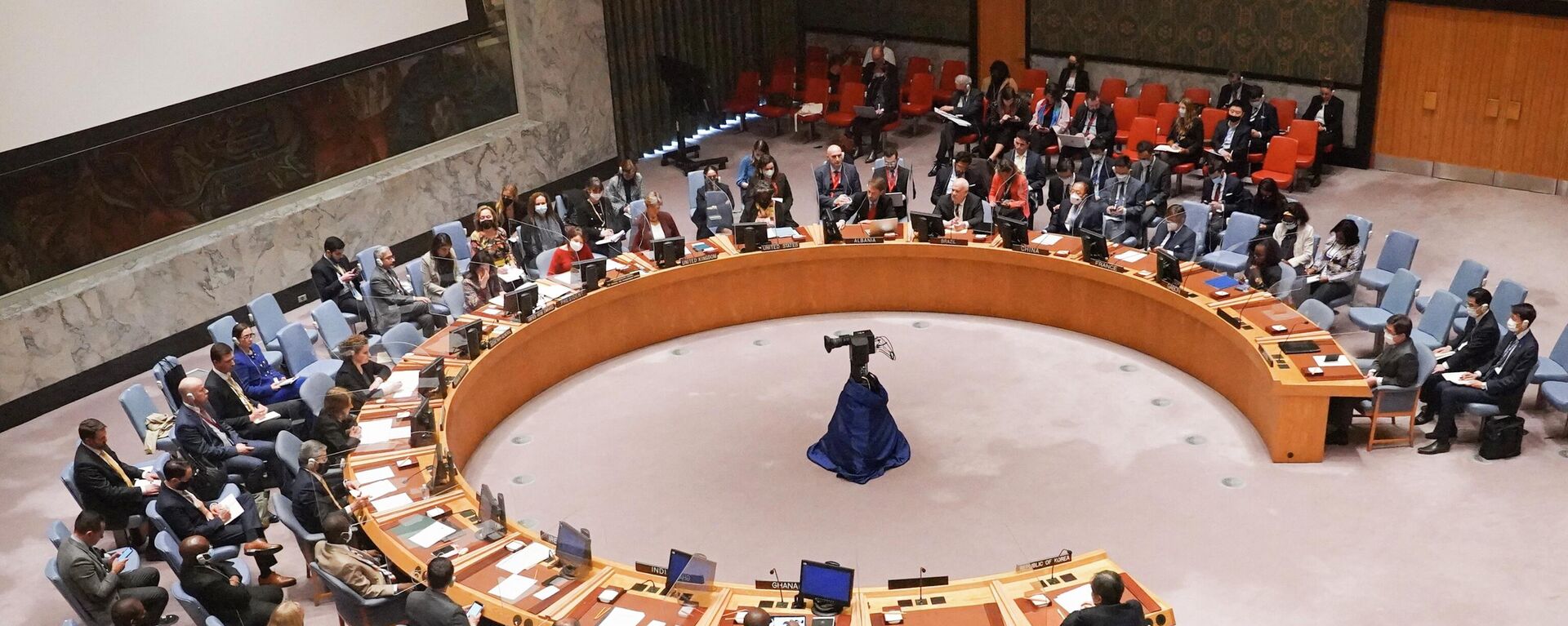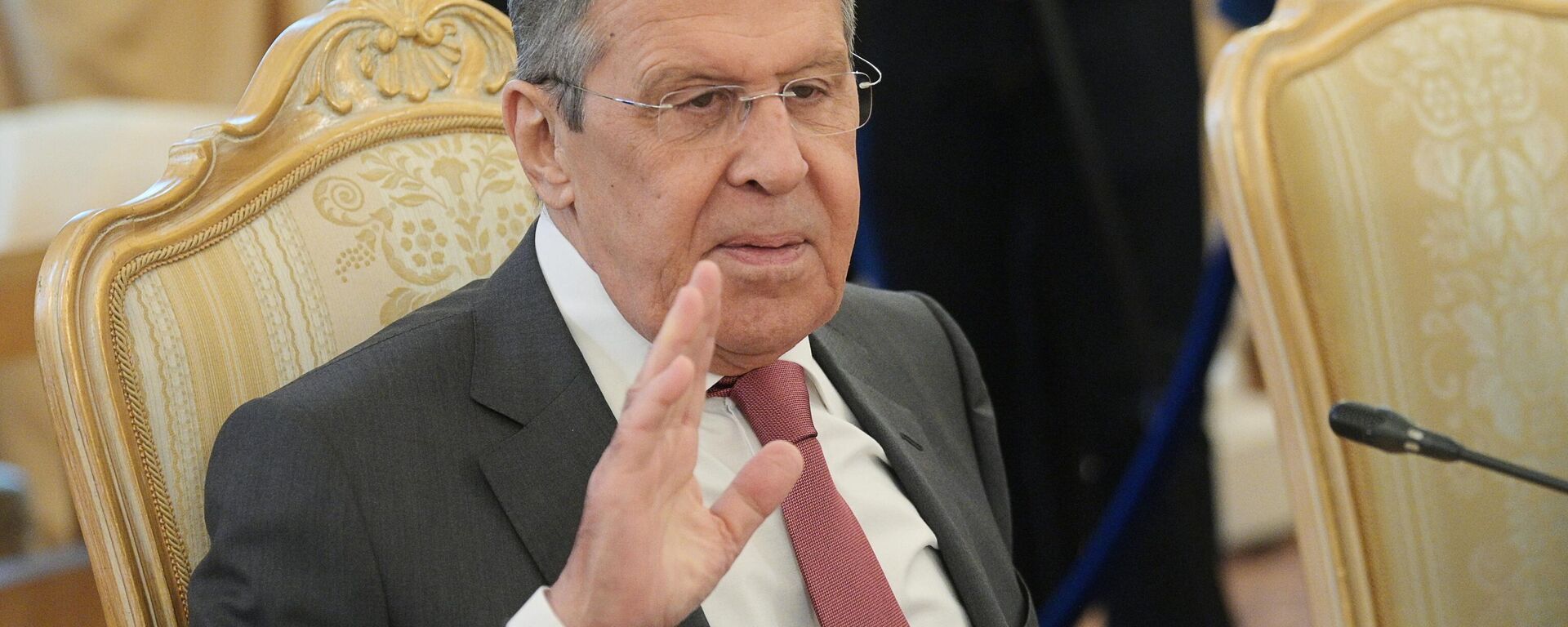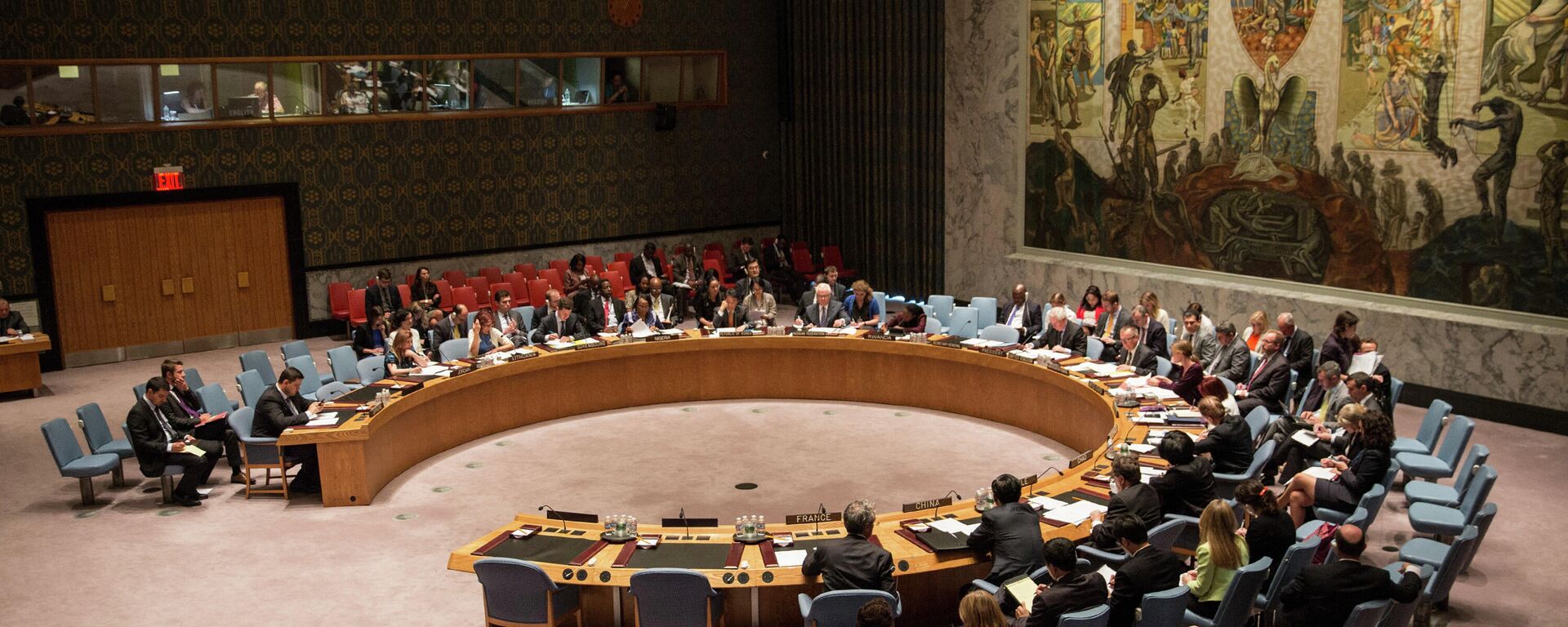https://sputnikglobe.com/20230331/ex-un-under-secretary-general-reveals-why-west-fears-russias-unsc-presidency-1109008326.html
Ex-UN Under-Secretary-General Reveals Why West Fears Russia's UNSC Presidency
Ex-UN Under-Secretary-General Reveals Why West Fears Russia's UNSC Presidency
Sputnik International
Former United Nations Under-Secretary-General Sergey Ordzhonikidze explained to Sputnik why certain countries seem so upset about this situation and what Moscow may do while it presides over the UN Security Council.
2023-03-31T17:35+0000
2023-03-31T17:35+0000
2023-03-31T17:35+0000
world
the united nations (un)
un security council (unsc)
russia
presidency
https://cdn1.img.sputnikglobe.com/img/07e7/03/1e/1108972274_0:2:1281:722_1920x0_80_0_0_eb59fd187c98d0c4854e5b11b3931ef7.jpg
As Russia's UNSC presidency draws closer, the White House lamented that there is "no feasible international legal pathway" to change that reality, while Ukraine blatantly branded Russia's presidency of the UN Security Council as a "bad joke."Sergey Ordzhonikidze, a veteran Russian diplomat and former United Nations Under-Secretary-General as well as former Director-General of the United Nations Office at Geneva appointed by then-Secretary-General Kofi Annan, explained to Sputnik why certain countries seem so upset about this situation and what Moscow may do while it presides over the UN Security Council.Sputnik: The presidency of the UN Security Council in April passes to Russia. Why does this rotating event scare the West so much? What exactly are their fears related to?Sergey Ordzhonikidze: You see, the presidency of the UN Security Council goes to Russia because, according to the rules of procedure, the president of the Security Council is a member of the Security Council on a rotating basis, according to the English alphabet. April is Russia's month. Why does this scare them? Because they expect Russia to naturally propose the inclusion of issues of interest to Russia. For example, every president on the eve of his presidency always presents his program, how he sees what issues should be addressed at the Security Council. This is a standard practice. And, of course, this is done in accordance with the foreign policy priorities of that state. Of course, the West knows what kind of priorities the Russian presidency will have, given the complexity of international relations. Of course, they fear that the Security Council will be preoccupied with the very issues they do not want it to deal with.Sputnik: What does Russia's presidency of the UN Security Council bring to the table? What can Russia accomplish in one month as president?Sergey Ordzhonikidze: As far as the generation of concrete products, i.e. resolutions, is concerned, it will of course depend on the agreement of all members of the Security Council, provided that there is no veto. But it is not only a question of what will be the result of the activities of the Council, but what the Council will do, what the agenda of the Security Council for International Security Issues will be. And the agenda of the Security Council for International Security Issues will be what Russia is proposing.These are questions concerning the violation of all kinds of security measures by the West, NATO's advance to Russia's border, i.e. the serious changes that such an advance has caused for the security of the Russian state. There will be specific questions related to this issue. Of course, the question will be raised about the gross violations of human rights in Ukraine, concerning the treatment of POWs, and the civilian population, violations of all kinds of norms of humanitarian law, and violations of the rights of believers, when the Russian Orthodox Church is essentially forcibly removed from its historically established activities in the Kiev-Pechersk Lavra. So, a whole range of issues. I think we will also talk about the Nord Stream explosions. Another thing is that it is clear in advance that there will be opposing points of view. But the very fact that these issues will be discussed in the Security Council does not please the West.It is difficult to predict and foresee specific outcomes. But it's not so much the result that's important here. You know, when the main body of the United Nations, which is responsible for maintaining peace and security, discusses some specific issues, today's pressing issues, of course it can only affect the ideology, situation and coverage by the press. That is, they are afraid that we will reveal some parts, problems, and details that they are trying to hide.Sputnik: Why does the UN want to change the principle by which countries chair the Security Council now?Sergey Ordzhonikidze: That is why they are afraid. They are very afraid that Russia will be the president of the Security Council. Very often, when a state presides over the Security Council, important political figures from the center (i.e. from that country's capital) come to this position. It is almost a tradition. That is, when a state wants to present its point of view to the international community as fully, objectively, and confidently as possible, this is how it happens. They are probably afraid of this as well.Sputnik: Western leaders have repeatedly called for reforming the UN Security Council. Why are they not satisfied with the current format? What is Russia's position on this issue?Sergey Ordzhonikidze: The UN Security Council was originally created with 15 states, and then it was expanded. And at the moment, the Security Council, which was conceived in 1945, of course, does not live up to the modern world's needs. Even though there has been an expansion of the Security Council. What the West wants to do - the West wants the Security Council to include allies, Western allies like Germany, Japan, and maybe some others. But then they would have a complete majority in the Council and the West would have a majority in the Council. In other words, they would not even have to think about getting nine votes.And our premise is, first of all, of course, the world has changed. But from our perspective, the world has changed enough that we have to translate that into realities. There are new countries in Asia, in Africa, in Latin America. Why is India, one of the largest countries in the world, not on the Security Council? Why is Brazil not on the Security Council? Not a single African state, for example South Africa, is on the Security Council. We do not want the world to be Western-centric. And we want that to be reflected in the composition of the Security Council.Sputnik: Many have tried to change the organization. In 2005, when you were UN Under Secretary General, Kofi Annan proposed two options for reforming the Security Council. The first was to increase the number of members to 24, with six new permanent members and three new non-permanent members. The second was to create eight new seats, which would be elected every four years, and one non-permanent seat. Neither scenario was accepted by the UN member states. Can you recall why Kofi Annan's idea was not supported?Sergey Ordzhonikidze: Of course, Kofi Annan was genuinely interested in this. One of the few Secretary Generals who was really interested in strengthening the UN and making it really effective. So he made this proposal. The question now is not how much to increase the size of the Council, but who will represent these numbers and which states will be on the Council, and as I said, this is where the fundamental disagreement exists. I remember back in the 1970s there was a working group that was working on the expansion of the Security Council. It took a lot of time and years, but of course we got nowhere. The problem is which states think that expansion is necessary. We, of course, believe that the expansion of the Security Council is necessary. But not at the expense of the West having a dominant majority in the Security Council.At that time, Annan's proposal was accepted, so to speak. The issue was discussed. But there was no agreement. That is, everyone said, yes, the Council should be expanded, and Western countries saw certain potential members on the Council, Russia and China saw others. The Third World saw someone else. That is, there was no clear consensus.Sputnik: The possibility of abolishing the veto is one of the most debated issues in the Security Council reorganization. French President Emmanuel Macron, in his speech to the General Assembly, called for limiting the veto power of the permanent members of the Security Council. What do you think the abolition of the veto could lead to?Sergey Ordzhonikidze: The veto is a cornerstone of the Security Council, and indeed of the United Nations, in support of international security measures. This understanding was there in 1945, and it is there now, many years later. If there is no balance of power in the composition of the Security Council, if it is possible by some mechanical majority vote to impose certain decisions, including the use of force in international relations, and the Security Council can do that under the Charter - to use force under Chapter Seven - then of course the Security Council can only lead to another war.By the way, here is a good example of this: American troops found themselves in Korea. How did they get there? Because the Soviets procedurally misbehaved in the Security Council. They took the decision of the Security Council and sent American troops there under the UN flag. Well, they gradually gathered their closest allies there. It's such a hard example, although it's very indicative of what the lack of a veto can lead to. And China's place at that time was held by Chiang Kai-shek. So the veto was not used, and that's where they ended up. By the way, Russia abstained from the resolution on Libya, so they bombed Libya. Those are the two most obvious examples. That is, they want to make the Security Council an obedient tool to NATO, a body that would legitimize the decisions of Washington and NATO's structures first and foremost.Sputnik: UN Secretary General Antonio Guterres said: “I think that there is now space for a much more serious discussion in relation to the Security Council reform. I think that the possibility of enlarging the Security Council is now seriously on the table. I'm still not optimistic about the right of veto… The world is not the same as it was 77 years ago. The 193 States Members of the United Nations are more than triple the 55 Member States that it had in 1945. However, the composition of the Security Council, responsible for global peace and security, was last fixed in 1965 and is far from reflecting the true diversity of the wider membership of the United Nations.” Do you agree with him? Why?Sergey Ordzhonikidze: Correct. He is right, and, of course, he was mainly referring to the permanent members of the Security Council, that is, those states that have veto power, that is, they essentially have a kind of coercive control over the decisions of the Security Council. Again, the question is that if we state the problem that the world has changed since 1945, everyone is willing to agree with such a statement. But when it comes to practical, concrete implementation, who should be on the Council and at whose expense should it be expanded? This is where the problem arises and has always arisen. And as long as the relations between the countries do not change, this problem will persist. All this can be solved only when there are really normal relations between states, when there is mutual understanding and mutual respect, and when the West's pressure on the rest of the world stops.Sputnik: How much of the UN's authority in the world has been undermined? Is there any alternative to it?Sergey Ordzhonikidze: I doubt that there will be alternatives for several reasons. Well, first of all, in order to create an alternative organization, you probably have to attract a lot of countries that would like to see another organization. Then the question arises: what is the charter of this organization, what are the rights, what are the powers? How will it differ from the UN? Undoubtedly, many people in the West would dream of creating an organization that would be completely controlled by the West. But what would they do there? It would be an analog of the next NATO, where Washington would tell everyone how to live and what to do and how to act.There is also the point that the West always has to be friends against somebody. And if there is no one against whom they can be friends, why do they need this organization? This is the question. And then many states, even though there is nothing and there is unlikely to be anything, they strongly doubt that something new is needed, something so new, incomprehensible, unexplainable, without any prospects for most states. My point is that the vast majority of UN member states are small and medium-sized states that have one vote according to the UN Charter. The UN is the only forum in the world - a unique one - where these states can express their views on an equal footing with the great powers. And what will happen next, if the UN does not act and there is no principle of equality of states, then of course everyone will have questions: what role will be assigned to them?Since 1945, there have been so many periods when the UN's authority has been at a high and a low point. In the beginning it was probably at its high point, because there was a kind of euphoria after the end of World War II, when nobody wanted war. That didn't last long, until the beginning of the Cold War. Finally, the UN is not an organization in and of itself. The UN is an organization of member states. So whatever the member states decide, that's how it's going to be. During the period of, let's say, improved relations, we know that a huge number of international treaties and agreements have been made in a wide variety of fields, from politico-military to economic, social, human rights, environmental, and so on and so forth. That is, from outer space to the ocean floor. Everything that exists on Earth has been considered, all problems have been addressed, and international agreements have been reached on many issues. Even something as unique as the Antarctic Treaty, which has been declared a nuclear-free zone. The Outer Space Treaty, which also prohibits states from placing nuclear weapons in space, and many others. And as soon as relations deteriorate, of course, the UN becomes dysfunctional.And we are witnessing these kinds of waves, tides, ebbs and flows. So I'm not a pessimist. I believe that everything is still to come. You can't completely say that this is it, that the world has come to an end and therefore nobody needs the UN. I believe that there are certain opportunities and prospects for improving relations on an equal and mutually respectful basis. And then the UN will function as its founding fathers intended.
https://sputnikglobe.com/20230331/un-security-council-how-its-rotating-presidency-works-and-who-wants-to-reform-it-1108987011.html
https://sputnikglobe.com/20230330/lavrov-to-chair-unsc-debate-on-middle-east-settlement-on-april-25-1108962801.html
https://sputnikglobe.com/20230327/unsc-fails-to-adopt-russia-drafted-resolution-calling-for-nord-stream-probe-1108846652.html
russia
Sputnik International
feedback@sputniknews.com
+74956456601
MIA „Rosiya Segodnya“
2023
Sputnik International
feedback@sputniknews.com
+74956456601
MIA „Rosiya Segodnya“
News
en_EN
Sputnik International
feedback@sputniknews.com
+74956456601
MIA „Rosiya Segodnya“
Sputnik International
feedback@sputniknews.com
+74956456601
MIA „Rosiya Segodnya“
unsc presidency 2023
As Russia's UNSC presidency draws closer, the White House lamented that there is "no feasible international legal pathway" to change that reality, while Ukraine blatantly branded Russia's
presidency of the UN Security Council as a "bad joke."
Sergey Ordzhonikidze, a veteran Russian diplomat and former United Nations Under-Secretary-General as well as former Director-General of the United Nations Office at Geneva appointed by then-Secretary-General Kofi Annan, explained to Sputnik why certain countries seem so upset about this situation and what Moscow may do while it presides over the UN Security Council.
Sputnik: The presidency of the UN Security Council in April passes to Russia. Why does this rotating event scare the West so much? What exactly are their fears related to?
Sergey Ordzhonikidze: You see, the presidency of the UN Security Council goes to Russia because, according to the rules of procedure, the president of the Security Council is a member of the Security Council on a rotating basis, according to the English alphabet. April is Russia's month. Why does this scare them? Because they expect Russia to naturally propose the inclusion of issues of interest to Russia.
For example, every president on the eve of his presidency always presents his program, how he sees what issues should be addressed at the Security Council. This is a standard practice. And, of course, this is done in accordance with the foreign policy priorities of that state. Of course, the West knows what kind of priorities the Russian presidency will have, given the complexity of international relations. Of course, they fear that the Security Council will be preoccupied with the very issues they do not want it to deal with.
Sputnik: What does Russia's presidency of the UN Security Council bring to the table? What can Russia accomplish in one month as president?
Sergey Ordzhonikidze: As far as the generation of concrete products, i.e. resolutions, is concerned, it will of course depend on the agreement of all members of the Security Council, provided that there is no veto. But it is not only a question of what will be the result of the activities of the Council, but what the Council will do, what the agenda of the Security Council for International Security Issues will be. And the agenda of the Security Council for International Security Issues will be what Russia is proposing.
These are questions concerning the violation of all kinds of security measures by the West, NATO's advance to Russia's border, i.e. the serious changes that such an advance has caused for the security of the Russian state. There will be specific questions related to this issue.
Of course, the question will be raised about the gross violations of human rights in Ukraine, concerning the treatment of POWs, and the civilian population, violations of all kinds of norms of humanitarian law, and violations of the rights of believers, when the Russian Orthodox Church is essentially forcibly removed from its historically established activities in the Kiev-Pechersk Lavra.
So, a whole range of issues. I think we will also talk about the Nord Stream explosions. Another thing is that it is clear in advance that there will be opposing points of view. But the very fact that these issues will be discussed in the Security Council does not please the West.
It is difficult to predict and foresee specific outcomes. But it's not so much the result that's important here. You know, when the main body of the United Nations, which is responsible for maintaining peace and security, discusses some specific issues, today's pressing issues, of course it can only affect the ideology, situation and coverage by the press. That is, they are afraid that we will reveal some parts, problems, and details that they are trying to hide.
Sputnik: Why does the UN want to change the principle by which countries chair the Security Council now?
Sergey Ordzhonikidze: That is why they are afraid. They are very afraid that Russia will be the president of the Security Council. Very often, when a state presides over the Security Council, important political figures from the center (i.e. from that country's capital) come to this position. It is almost a tradition. That is, when a state wants to present its point of view to the international community as fully, objectively, and confidently as possible, this is how it happens. They are probably afraid of this as well.
Sputnik: Western leaders have repeatedly called for reforming the UN Security Council. Why are they not satisfied with the current format? What is Russia's position on this issue?
Sergey Ordzhonikidze: The UN Security Council was originally created with 15 states, and then it was expanded. And at the moment, the Security Council, which was conceived in 1945, of course, does not live up to the modern world's needs. Even though there has been an expansion of the Security Council. What the West wants to do - the West wants the Security Council to include allies, Western allies like Germany, Japan, and maybe some others. But then they would have a complete majority in the Council and the West would have a majority in the Council. In other words, they would not even have to think about getting nine votes.
And our premise is, first of all, of course, the world has changed. But from our perspective, the world has changed enough that we have to translate that into realities. There are new countries in Asia, in Africa, in Latin America. Why is India, one of the largest countries in the world, not on the Security Council? Why is Brazil not on the Security Council? Not a single African state, for example South Africa, is on the Security Council. We do not want the world to be Western-centric. And we want that to be reflected in the composition of the Security Council.
Sputnik: Many have tried to change the organization. In 2005, when you were UN Under Secretary General, Kofi Annan proposed two options for reforming the Security Council. The first was to increase the number of members to 24, with six new permanent members and three new non-permanent members. The second was to create eight new seats, which would be elected every four years, and one non-permanent seat. Neither scenario was accepted by the UN member states. Can you recall why Kofi Annan's idea was not supported?
Sergey Ordzhonikidze: Of course, Kofi Annan was genuinely interested in this. One of the few Secretary Generals who was really interested in strengthening the UN and making it really effective. So he made this proposal. The question now is not how much to increase the size of the Council, but who will represent these numbers and which states will be on the Council, and as I said, this is where the fundamental disagreement exists.
I remember back in the 1970s there was a working group that was working on the expansion of the Security Council. It took a lot of time and years, but of course we got nowhere. The problem is which states think that expansion is necessary. We, of course, believe that the expansion of the Security Council is necessary. But not at the expense of the West having a dominant majority in the Security Council.
At that time, Annan's proposal was accepted, so to speak. The issue was discussed. But there was no agreement. That is, everyone said, yes, the Council should be expanded, and Western countries saw certain potential members on the Council, Russia and China saw others. The Third World saw someone else. That is, there was no clear consensus.
Sputnik: The possibility of abolishing the veto is one of the most debated issues in the Security Council reorganization. French President Emmanuel Macron, in his speech to the General Assembly, called for limiting the veto power of the permanent members of the Security Council. What do you think the abolition of the veto could lead to?
Sergey Ordzhonikidze: The veto is a cornerstone of the Security Council, and indeed of the United Nations, in support of international security measures. This understanding was there in 1945, and it is there now, many years later.
If there is no balance of power in the composition of the Security Council, if it is possible by some mechanical majority vote to impose certain decisions, including the use of force in international relations, and the Security Council can do that under the Charter - to use force under Chapter Seven - then of course the Security Council can only lead to another war.
By the way, here is a good example of this: American troops found themselves in Korea. How did they get there? Because the Soviets procedurally misbehaved in the Security Council. They took the decision of the Security Council and sent American troops there under the UN flag. Well, they gradually gathered their closest allies there.
It's such a hard example, although it's very indicative of what the lack of a veto can lead to. And China's place at that time was held by Chiang Kai-shek. So the veto was not used, and that's where they ended up. By the way, Russia abstained from the resolution on Libya, so they bombed Libya. Those are the two most obvious examples. That is, they want to make the Security Council an obedient tool to NATO, a body that would legitimize the decisions of Washington and NATO's structures first and foremost.
Sputnik: UN Secretary General Antonio Guterres said: “I think that there is now space for a much more serious discussion in relation to the Security Council reform. I think that the possibility of enlarging the Security Council is now seriously on the table. I'm still not optimistic about the right of veto… The world is not the same as it was 77 years ago. The 193 States Members of the United Nations are more than triple the 55 Member States that it had in 1945. However, the composition of the Security Council, responsible for global peace and security, was last fixed in 1965 and is far from reflecting the true diversity of the wider membership of the United Nations.” Do you agree with him? Why?
Sergey Ordzhonikidze: Correct. He is right, and, of course, he was mainly referring to the permanent members of the Security Council, that is, those states that have veto power, that is, they essentially have a kind of coercive control over the decisions of the Security Council. Again, the question is that if we state the problem that the world has changed since 1945, everyone is willing to agree with such a statement.
But when it comes to practical, concrete implementation, who should be on the Council and at whose expense should it be expanded? This is where the problem arises and has always arisen. And as long as the relations between the countries do not change, this problem will persist. All this can be solved only when there are really normal relations between states, when there is mutual understanding and mutual respect, and when the West's pressure on the rest of the world stops.
Sputnik: How much of the UN's authority in the world has been undermined? Is there any alternative to it?
Sergey Ordzhonikidze: I doubt that there will be alternatives for several reasons. Well, first of all, in order to create an alternative organization, you probably have to attract a lot of countries that would like to see another organization. Then the question arises: what is the charter of this organization, what are the rights, what are the powers? How will it differ from the UN?
Undoubtedly, many people in the West would dream of creating an organization that would be completely controlled by the West. But what would they do there? It would be an analog of the next NATO, where Washington would tell everyone how to live and what to do and how to act.
There is also the point that the West always has to be friends against somebody. And if there is no one against whom they can be friends, why do they need this organization? This is the question. And then many states, even though there is nothing and there is unlikely to be anything, they strongly doubt that something new is needed, something so new, incomprehensible, unexplainable, without any prospects for most states.
My point is that the vast majority of UN member states are small and medium-sized states that have one vote according to the UN Charter. The UN is the only forum in the world - a unique one - where these states can express their views on an equal footing with the great powers. And what will happen next, if the UN does not act and there is no principle of equality of states, then of course everyone will have questions: what role will be assigned to them?
Since 1945, there have been so many periods when the UN's authority has been at a high and a low point. In the beginning it was probably at its high point, because there was a kind of euphoria after the end of World War II, when nobody wanted war. That didn't last long, until the beginning of the Cold War. Finally, the UN is not an organization in and of itself.
The UN is an organization of member states. So whatever the member states decide, that's how it's going to be. During the period of, let's say, improved relations, we know that a huge number of international treaties and agreements have been made in a wide variety of fields, from politico-military to economic, social, human rights, environmental, and so on and so forth. That is, from outer space to the ocean floor.
Everything that exists on Earth has been considered, all problems have been addressed, and international agreements have been reached on many issues. Even something as unique as the Antarctic Treaty, which has been declared a nuclear-free zone. The Outer Space Treaty, which also prohibits states from placing nuclear weapons in space, and many others. And as soon as relations deteriorate, of course, the UN becomes dysfunctional.
And we are witnessing these kinds of waves, tides, ebbs and flows. So I'm not a pessimist. I believe that everything is still to come. You can't completely say that this is it, that the world has come to an end and therefore nobody needs the UN. I believe that there are certain opportunities and prospects for improving relations on an equal and mutually respectful basis. And then the UN will function as its founding fathers intended.
